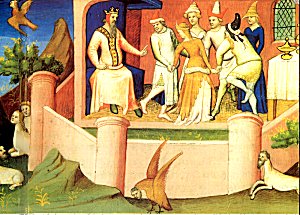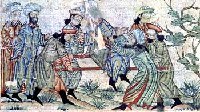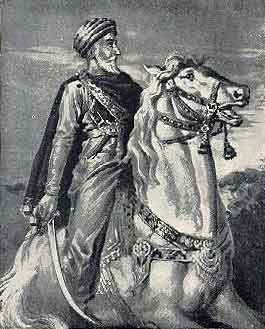Islam: A Tool of Domination
Muhammad and Hasan Sabbah
By Ali Sina
 "Two
men in the year 1092 stood on the ramparts of a medieval castle - the
Eagle's Nest - perched high upon the crags of the Persian mountains: the
personal representative of the Emperor and the veiled figure who claimed
to be the incarnation of God on earth. Hasan, son of
Sabbah
, Sheikh of the Mountains and leader of the Assassins, spoke: "You
see that devotee standing guard on yonder turret-top? Watch!" "Two
men in the year 1092 stood on the ramparts of a medieval castle - the
Eagle's Nest - perched high upon the crags of the Persian mountains: the
personal representative of the Emperor and the veiled figure who claimed
to be the incarnation of God on earth. Hasan, son of
Sabbah
, Sheikh of the Mountains and leader of the Assassins, spoke: "You
see that devotee standing guard on yonder turret-top? Watch!"
He
made a signal. Instantly the white-robed figure threw up his hands in
salutation, and cast himself two thousand feet into the foaming torrent
which surrounded the fortress.
"I
have seventy thousand men - and women - throughout
Asia
, each one of them ready to do my bidding. Can your master, Malik Shah,
say the same? And he asks me to surrender to his sovereignty! This is your
answer. Go!"
Such
a scene may be worthy of the most exaggerated of horror films. And yet it
took place in historical fact." [1]
Hasan
Sabbah (died in 1124) was the founder of the Ismailite militia movement of
Nizari sect of Islam. He created an empire of terror by demanding
from his followers, total devotion and by encouraging them to commit
assassinations promising them that if killed they would go to paradise. He
used to drug the initiates and take them to a secret garden full of delights
and beautiful girls, letting them spent a day of orgy and then he would
carry them out while asleep and would tell them that they had been given a
glimpse of paradise and if they assassinate those whom he desired they will
be able to go back to that paradise and stay there forever. These devotees were
known as Hashishin (druggers) from which
the English word assassin is originated.
|

|
|
The ‘Old Man of the Mountain and
his Paradise’, as depicted in a manuscript of the travels of
Odoric of Pordenone (d. 1331) contained in the Livre des
Merveilles (Bibliothèque Nationale, Paris, Ms. fr. 2810). The
manuscript was produced in the 15th century for John the Fearless,
Duke of Burgundy. |
However, Hasan himself was an unbeliever. He created an order through
which the devotees gradually gained the secret knowledge of the truth. In
the first degree of initiation they
were required to doubt all conventional beliefs and submit their
intelligence and will to their teacher. As they advanced more truth were
revealed to them and more devotion to their master was demanded. To
qualify for the eighth degree, the aspirant had to believe that all
religion, philosophy and the like were fraudulent. All that mattered was
the individual, who could attain fulfillment only through servitude to the
greatest developed power - the Imam. The ninth and last degree brought the
revelation of the secret that there was no such thing as God or belief:
All that mattered was action. And the only possessor of the reasons for
carrying out any action was the chief of the sect. [1]
 Based
on this doctrine the power of the chief depends on the absolute obedience
of the devotees to him alone. The devotees are led to believe that the
chief is the intermediary between them and God, but the chief knows that
there is no God and all devotion is to him. God is a convenient tool to
kindle the devotion of the believer. All notions of good and bad and right and
wrong fade. Good is obedience of the Imam and bad is disobeying him.
If it is the wish of the Imam to murder, you murder and if it is his wish
that you die, you die. Obedience to Imam is obedience to God and
disobedience to him is rebellion against God. But the Imam himself was an
unbeliever. Based
on this doctrine the power of the chief depends on the absolute obedience
of the devotees to him alone. The devotees are led to believe that the
chief is the intermediary between them and God, but the chief knows that
there is no God and all devotion is to him. God is a convenient tool to
kindle the devotion of the believer. All notions of good and bad and right and
wrong fade. Good is obedience of the Imam and bad is disobeying him.
If it is the wish of the Imam to murder, you murder and if it is his wish
that you die, you die. Obedience to Imam is obedience to God and
disobedience to him is rebellion against God. But the Imam himself was an
unbeliever.
 According to the biography of Nizam ul Mulk the legendary Iranian prime
minister, contemporary to Hasan-i Sabbah, Hasan was a cunning fraudulent man. “a
hypocrite and a self-seeking villain. He
was so clever at dissimulation that he appeared to be pious when he was
not, and before long he had somehow completely captured the mind of the
Shah." Malik Shah was
young, and Hasan was trained in the Shiah art of winning people over by
apparent honesty. [1] According to the biography of Nizam ul Mulk the legendary Iranian prime
minister, contemporary to Hasan-i Sabbah, Hasan was a cunning fraudulent man. “a
hypocrite and a self-seeking villain. He
was so clever at dissimulation that he appeared to be pious when he was
not, and before long he had somehow completely captured the mind of the
Shah." Malik Shah was
young, and Hasan was trained in the Shiah art of winning people over by
apparent honesty. [1]
"The order created by Hasan-i
Sabbah has lasted nearly a thousand years and had a significant impact on all subsequent cults
and secret societies in the West. The Templars, the Society of Jesus,
Priory de Sion, the Freemasons, the Rosicrucians, etc. all owe their
organizational efficiency to Hasan. In fact, the Illuminati had their
origins in the mystical aspect of the Hashishin order" [2]
The Agha Khans are successors of Hasan Sabbah.
1 2
> Next |
